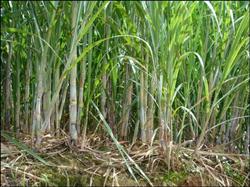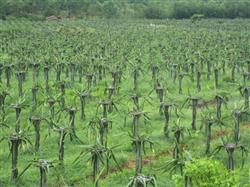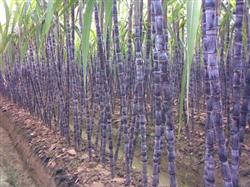Scientific fertilization Technology for planting Sugarcane

China is the top three sugar-producing country in the world, sucrose is also one of the necessities of people's life, and sugarcane is one of the main raw materials of sugar production. Due to the well-developed root system and long growth period of sugarcane (usually 10-11 months), a large amount of nutrients are taken away from the soil in each crop. Therefore, the application of Gymboree microbial fertilizer with more than 500 million effective living bacteria in sugarcane can improve soil structure and is very effective in increasing yield and improving soil. Base fertilizer: the application of sufficient base fertilizer can make sugarcane sprout rapidly, the root system extends rapidly, and the tillers are early and strong. If the application of base fertilizer is insufficient and only depends on topdressing in the later stage, it will lead to weak seedlings, easy to be thick and thin, weak foundation and easy to lodge. The base fertilizer is mainly organic fertilizer, supplemented by inorganic fertilizer, because sugarcane has developed root system and long growth cycle, supplemented by Gymboree microbial fertilizer, which can effectively improve the soil and supplement the required fertility. Topdressing: sugarcane needs fertilizer urgently but less at the seedling stage, and the demand for nitrogen is large, followed by potassium and phosphorus. Although sugarcane needs less fertilizer at seedling stage, fertilization at seedling stage is very important to the growth of sugarcane. If insufficient fertilization is applied at seedling stage, it will lead to short growth and poor development of seedlings and tillers. Even if fertilizer is supplemented later, it will be difficult to recover and eventually lead to the decline of yield and quality. High nitrogen fast-soluble fertilizer is the best seedling fertilizer. It is recommended to use compound fertilizer and Gymboree microbial fertilizer. If the manure is insufficient, the amount of fertilizer can be increased appropriately. It should be applied directly in combination with ploughing and soil cultivation, or in the case of water, and in the case of drought. In addition, the lack of seedlings should be checked in time to make the population grow neatly. The application of tillering fertilizer of sugarcane should be determined according to the specific situation. If the early stage fertilization is sufficient and the sugarcane seedlings are strong, it can be applied at one time at the tillering stage, and the dosage should be less. The method of application is the same as that of seedling fertilizer. Sugarcane has a large demand for fertilizer during the elongation period, accounting for more than 50% of the whole growth period, so emphasis should be placed on fertilization. Because phosphorus and potassium fertilizer is mainly used as base fertilizer and early application, so this period is mainly topdressing nitrogen fertilizer. The amount of stem fertilizer should be determined according to the ground and seedlings. If the sugarcane seedlings showed premature senescence, they could be applied once, while those with stable growth could be applied twice in early July and early August, and the former was heavy and the latter was light. Fertilization is generally carried out after rain or when the soil is wet, it is appropriate to combine weeding and soil cultivation, the mixed fertilizer strips or holes are applied to 10 cm next to the sugarcane pocket and covered with thick soil. It is not suitable to apply fertilizer before heavy rain to prevent Rain Water from showering. If there is no rain for 3 days after fertilization, and the loose soil begins to dry, it should be watered in time. If the soil is dry, it is necessary to fight drought first and then apply fertilizer. Tail fertilizer: some people think that tail fertilizer should be applied because sugarcane growth and underground sugarcane buds need certain nutrients. Some people think that it is not suitable to apply tail fertilizer, because although a small amount of nutrients are needed for sugarcane growth in the later stage, it can be supplied through the redistribution of nutrients in sugarcane and the nutrients stored in the soil, as long as there is enough fertilization in the early and middle stages, in addition, the field is muggy in the later stage. Work is very difficult. We suggest that farmers should decide according to the fertility of the field, if the field is fertile and the early stage is sufficient, the stem fertilizer can be fertilized according to the growing sugarcane seedlings, but without tail fertilizer, Gymboree microbial fertilizer can be directly applied for foliar spraying; if the soil fertility is poor and the early fertilization is insufficient, the mixture of tail fertilizer and Gymboree microbial fertilizer can be applied appropriately. The application time should not be too late, and the dosage should not be too much, so as not to delay ripening and reduce sugar content, and cultivate the soil after application. If there is a phenomenon of de-fertilization one month before harvest, foliar fertilizer should be sprayed. With the renewal of sugarcane varieties and the improvement of yield and multiple cropping index, the lack of trace elements in soil is becoming more and more obvious. sugarcane farmers should pay attention to the supplement of medium and trace elements on the basis of stable nitrogen, phosphorus and potassium. Therefore, when planting sugarcane, an appropriate amount of Gymboree microbial fertilizer is applied, and the effective living bacteria can fix nitrogen, phosphorus, potassium and trace elements in the soil.
- Prev

Irrigation and drainage of dragon fruit (part I)
Soil water status is closely related to tree development, high yield, stable yield and tree life. It is an important task of orchard soil management to keep soil moisture condition in a range conducive to the growth and development of fruit trees through irrigation and drainage. 1. Irrigation is the lifeblood of plant growth and the essential activity of all organs.
- Next

Cultivation techniques of Fruit Sugarcane
1. Variety selection at present, there are two kinds of fruit sugarcane planted in Yuanjiang County: crisp red sugarcane and magenta sugarcane. According to the results of the comparison test conducted in Daming Um in 2000, crisp red sugarcane is obviously better than magenta sugarcane in stem diameter, stem weight, Internode length, silty quality and stomachability, or in unit yield and commodity rate.
Related
- Moge, come on! The staff of the peasant association in the producing area of cantaloupe were frightened when the crowd gathered.
- Causes and Solutions of low Fruit setting rate of Apple
- Symptoms and control measures of passion fruit virus disease
- Fruit growing lesson: how do apple orchards keep high yields?
- Can you build orchards in the mountains? What are the pros and cons?
- How to manage the coloring period of Crisson grape?
- This paper introduces the processing technology of two kinds of fig products.
- How much is a month for retired teachers in rural areas by 2020?
- How can strawberry planting increase sugar content? We should pay attention to management in many aspects.
- What are the cultivation techniques on how to improve the yield of golden fruit?

